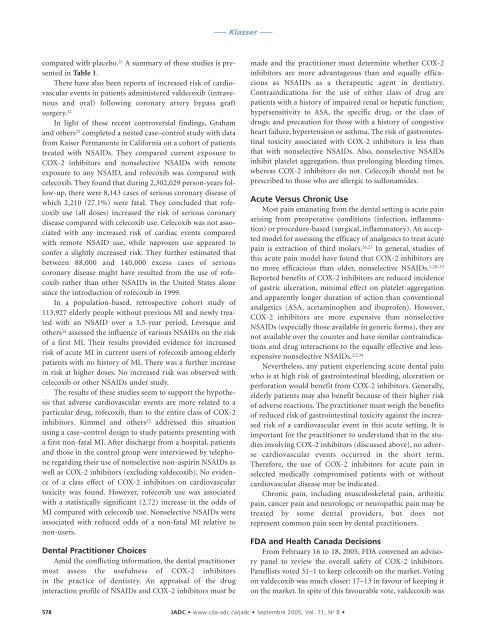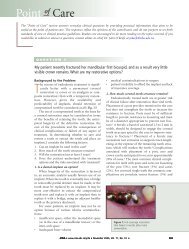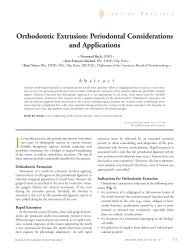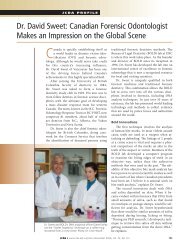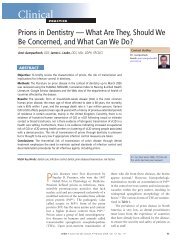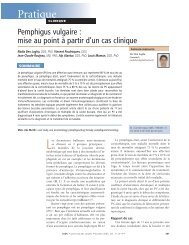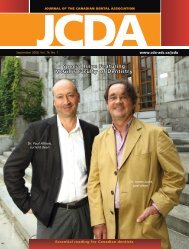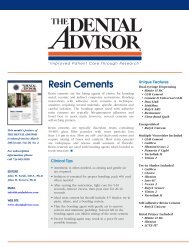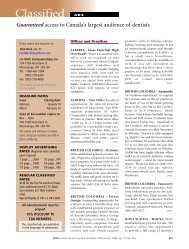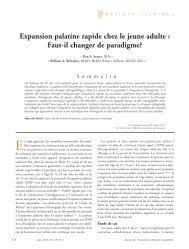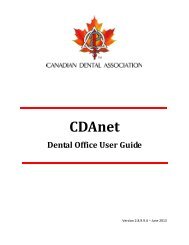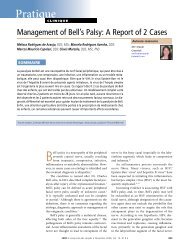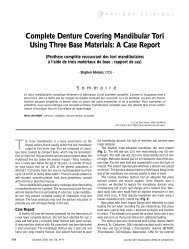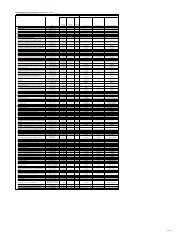JADC - Canadian Dental Association
JADC - Canadian Dental Association
JADC - Canadian Dental Association
Create successful ePaper yourself
Turn your PDF publications into a flip-book with our unique Google optimized e-Paper software.
compared with placebo. 21 A summary of these studies is presented<br />
in Table 1.<br />
There have also been reports of increased risk of cardiovascular<br />
events in patients administered valdecoxib (intravenous<br />
and oral) following coronary artery bypass graft<br />
surgery. 22<br />
In light of these recent controversial findings, Graham<br />
and others 23 completed a nested case–control study with data<br />
from Kaiser Permanente in California on a cohort of patients<br />
treated with NSAIDs. They compared current exposure to<br />
COX-2 inhibitors and nonselective NSAIDs with remote<br />
exposure to any NSAID, and rofecoxib was compared with<br />
celecoxib. They found that during 2,302,029 person-years follow-up,<br />
there were 8,143 cases of serious coronary disease of<br />
which 2,210 (27.1%) were fatal. They concluded that rofecoxib<br />
use (all doses) increased the risk of serious coronary<br />
disease compared with celecoxib use. Celecoxib was not associated<br />
with any increased risk of cardiac events compared<br />
with remote NSAID use, while naproxen use appeared to<br />
confer a slightly increased risk. They further estimated that<br />
between 88,000 and 140,000 excess cases of serious<br />
coronary disease might have resulted from the use of rofecoxib<br />
rather than other NSAIDs in the United States alone<br />
since the introduction of rofecoxib in 1999.<br />
In a population-based, retrospective cohort study of<br />
113,927 elderly people without previous MI and newly treated<br />
with an NSAID over a 3.5-year period, Levesque and<br />
others 24 assessed the influence of various NSAIDs on the risk<br />
of a first MI. Their results provided evidence for increased<br />
risk of acute MI in current users of rofecoxib among elderly<br />
patients with no history of MI. There was a further increase<br />
in risk at higher doses. No increased risk was observed with<br />
celecoxib or other NSAIDs under study.<br />
The results of these studies seem to support the hypothesis<br />
that adverse cardiovascular events are more related to a<br />
particular drug, rofecoxib, than to the entire class of COX-2<br />
inhibitors. Kimmel and others 25 addressed this situation<br />
using a case–control design to study patients presenting with<br />
a first non-fatal MI. After discharge from a hospital, patients<br />
and those in the control group were interviewed by telephone<br />
regarding their use of nonselective non-aspirin NSAIDs as<br />
well as COX-2 inhibitors (excluding valdecoxib). No evidence<br />
of a class effect of COX-2 inhibitors on cardiovascular<br />
toxicity was found. However, rofecoxib use was associated<br />
with a statistically significant (2.72) increase in the odds of<br />
MI compared with celecoxib use. Nonselective NSAIDs were<br />
associated with reduced odds of a non-fatal MI relative to<br />
non-users.<br />
<strong>Dental</strong> Practitioner Choices<br />
Amid the conflicting information, the dental practitioner<br />
must assess the usefulness of COX-2 inhibitors<br />
in the practice of dentistry. An appraisal of the drug<br />
interaction profile of NSAIDs and COX-2 inhibitors must be<br />
––– Klasser –––<br />
578 <strong>JADC</strong> • www.cda-adc.ca/jadc • Septembre 2005, Vol. 71, N o 8 •<br />
made and the practitioner must determine whether COX-2<br />
inhibitors are more advantageous than and equally efficacious<br />
as NSAIDs as a therapeutic agent in dentistry.<br />
Contraindications for the use of either class of drug are<br />
patients with a history of impaired renal or hepatic function;<br />
hypersensitivity to ASA, the specific drug, or the class of<br />
drugs; and precaution for those with a history of congestive<br />
heart failure, hypertension or asthma. The risk of gastrointestinal<br />
toxicity associated with COX-2 inhibitors is less than<br />
that with nonselective NSAIDs. Also, nonselective NSAIDs<br />
inhibit platelet aggregation, thus prolonging bleeding times,<br />
whereas COX-2 inhibitors do not. Celecoxib should not be<br />
prescribed to those who are allergic to sulfonamides.<br />
Acute Versus Chronic Use<br />
Most pain emanating from the dental setting is acute pain<br />
arising from preoperative conditions (infection, inflammation)<br />
or procedure-based (surgical, inflammatory). An accepted<br />
model for assessing the efficacy of analgesics to treat acute<br />
pain is extraction of third molars. 26,27 In general, studies of<br />
this acute pain model have found that COX-2 inhibitors are<br />
no more efficacious than older, nonselective NSAIDs. 5,28–33<br />
Reported benefits of COX-2 inhibitors are reduced incidence<br />
of gastric ulceration, minimal effect on platelet aggregation<br />
and apparently longer duration of action than conventional<br />
analgesics (ASA, acetaminophen and ibuprofen). However,<br />
COX-2 inhibitors are more expensive than nonselective<br />
NSAIDs (especially those available in generic forms), they are<br />
not available over the counter and have similar contraindications<br />
and drug interactions to the equally effective and lessexpensive<br />
nonselective NSAIDs. 2,5,34<br />
Nevertheless, any patient experiencing acute dental pain<br />
who is at high risk of gastrointestinal bleeding, ulceration or<br />
perforation would benefit from COX-2 inhibitors. Generally,<br />
elderly patients may also benefit because of their higher risk<br />
of adverse reactions. The practitioner must weigh the benefits<br />
of reduced risk of gastrointestinal toxicity against the increased<br />
risk of a cardiovascular event in this acute setting. It is<br />
important for the practitioner to understand that in the studies<br />
involving COX-2 inhibitors (discussed above), no adverse<br />
cardiovascular events occurred in the short term.<br />
Therefore, the use of COX-2 inhibitors for acute pain in<br />
selected medically compromised patients with or without<br />
cardiovascular disease may be indicated.<br />
Chronic pain, including musculoskeletal pain, arthritic<br />
pain, cancer pain and neurologic or neuropathic pain may be<br />
treated by some dental providers, but does not<br />
represent common pain seen by dental practitioners.<br />
FDA and Health Canada Decisions<br />
From February 16 to 18, 2005, FDA convened an advisory<br />
panel to review the overall safety of COX-2 inhibitors.<br />
Panellists voted 31–1 to keep celecoxib on the market. Voting<br />
on valdecoxib was much closer: 17–13 in favour of keeping it<br />
on the market. In spite of this favourable vote, valdecoxib was


